ISLAMABAD: Pakistan must take long-term and wide-ranging measures to ensure the revival of its industrial and services sectors, senior economists said after the launch of Pakistan Economic Survey 2019-20 on Thursday, recommending the government to keep the economic targets realistic for the upcoming fiscal year.
The country’s Gross Domestic Product (GDP) growth for the fiscal year 2020 is estimated at negative 0.38 percent due to the negative 2.64 percent and negative 0.59 percent growth in the industrial and services sectors, respectively.
“The clock has turned back. This government started the fiscal year with higher deficit and lower growth and it was ending with the same trend,” Khurram Husain, an economist and business editor at daily Dawn, told Arab News.
He said that much of the negative economic impact on different sectors during the outgoing fiscal year was due to the COVID-19 outbreak, but “still the government should have performed better.”
Husain said the government had initiated macroeconomic adjustments under the International Monetary Fund’s (IMF) $6 billion bailout package, and it would have to take “tough measures” in the upcoming year as well to ensure social protection for the poor and job opportunities for the bulging youth.
Pakistan signed the bailout package with the IMF in May last year to stave off a looming balance of payments crisis. The country had initiated tough economic reforms in the public sector under the program which experts believe resulted in the devaluation of rupee against dollar and high interest rates.
“The good thing, at the moment, is that inflation rate and energy prices are low as compared to the previous months,” Husain said, urging the government to adopt a holistic approach to revive the economy.
Economists said the survey document was a reflection of the “ground realities” and the government should take guidance from it to prepare the budget for the upcoming financial year.
“This was a challenging year. The economy was already in a downturn because of the type of policies we pursued to correct our balance of payments,” Dr. Ashfaque Hasan Khan, senior economist and Principal and Dean of the School of Social Sciences and Humanities at NUST, told Arab News.
He said the economy had contracted, the per capita income had declined and COVID-19 had severely dampened the domestic and global economic activities. “This is the time to provide relief to businesses and people to revive the economy and not to indulge in setting unrealistic revenue targets,” Khan said.
Dr. Vaqar Ahmed, who works as the deputy executive director at the Sustainable Development Policy Institute in Islamabad, said the government had managed to gain “some public sympathy and favor” due to the impact of COVID-19 on the country’s economy in the last two quarters of the financial year.
However, he added: “It has clearly failed to come up with viable structural reforms targets agreed with the IMF like circular debt plan, privatization of public entities and overcoming losses in public sector enterprises.”
Ahmed suggested the government to present a clear-cut policy on tax targets, power sector subsidies for consumers and provincial revenue surpluses in the upcoming budget to revive the economy
“The economic revival remains the real challenge for the government, and this can only be achieved through transparency in each sector and good governance,” he added.
Wide-ranging measures required to boost Pakistan’s economy — experts
https://arab.news/jdjj7
Wide-ranging measures required to boost Pakistan’s economy — experts
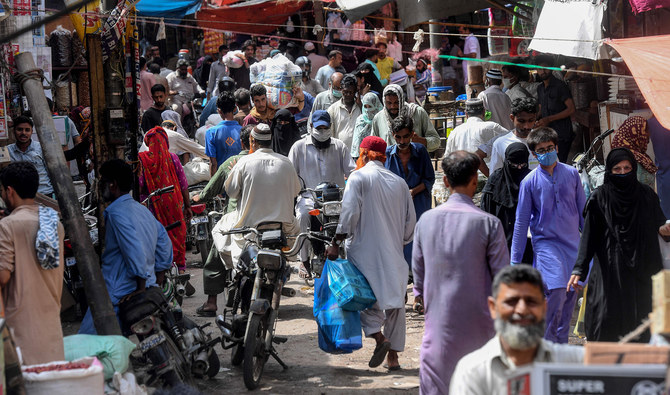
- Economists ask the government to set realistic revenue targets to revive the economy
- Say the government had failed to achieve structural reform targets that were agreed with the IMF
Pakistan PM mourns death of UAE royal, lauds role in strengthening bilateral ties
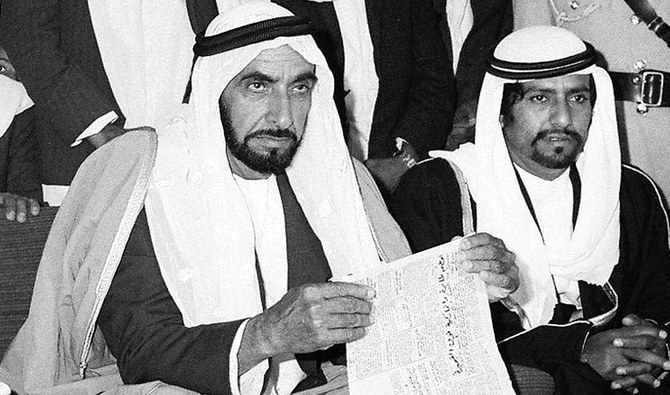
- Sheikh Tahnoun bin Mohammed worked closely with the UAE founding father, helped implement the federal project
- The UAE president has announced a seven-day mourning period after the death of Sheikh Tahnoun on May 1
ISLAMABAD: Prime Minister Shehbaz Sharif on Thursday expressed grief over the death of the United Arab Emirates royal, Sheikh Tahnoun bin Mohammed Al Nahyan, while admiring his contributions to building stronger relations between the two countries.
Sheikh Tahnoun was Abu Dhabi’s representative in the Al Ain region of the Gulf state.
His demise at the age of 82 prompted UAE President Sheikh Mohamed bin Zayed Al Nahyan to announced a seven-day mourning period in which the country’s flag would be flown at half-mast.
“Deeply saddened at the demise of His Highness Sheikh Tahnoun bin Mohamed Al Nahyan,” the Pakistan prime minister said in a social media post. “Our thoughts and prayers are with the leadership and people of the UAE at this hour of grief.”
“He will be long remembered for his contribution to building stronger ties between Pakistan and the U.A.E.,” the post added. “May Allah Almighty grant him eternal peace.”
Sheikh Tahnoun worked closely with the UAE founding father, Sheikh Zayed bin Sultan Al Nahyan, and was part of the team that implemented the federal project that led to the declaration of the Union in 1971.
He also served his country in several key capacities in subsequent years and worked to provide better governance to its people.
Pakistani think tank reports significant surge in militant attacks with 70 killed in April
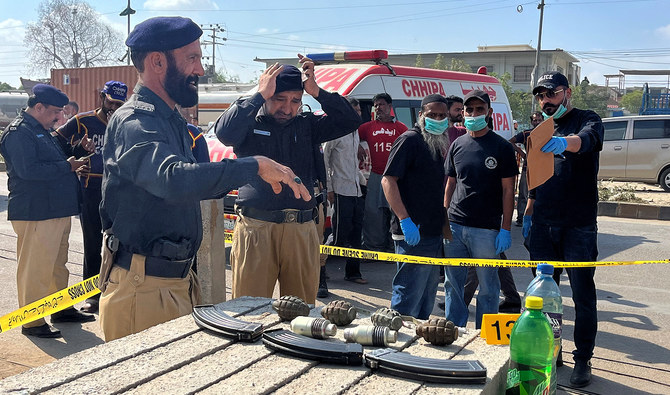
- Pakistan Institute for Conflict and Security Studies says Khyber Pakhtunkhwa suffered maximum militant violence
- Pakistan has endured 323 militant attacks during the first four months of the year, resulting in 324 fatalities
ISLAMABAD: A Pakistani think tank circulated a report on a significant increase in the number of militant attacks in the country on Wednesday, saying 70 people lost their lives in at least 77 verifiable episodes of extremist violence in the month of April.
Pakistan has witnessed a prolonged surge in militant attacks since the breakdown of a fragile ceasefire between the government and a proscribed armed network, Tehreek-e-Taliban Pakistan (TTP), in November 2022.
Apart from TTP fighters, other extremist and separatist groups have also targeted Pakistani security forces and civilians in recent months.
According to Pakistan Institute for Conflict and Security Studies (PICSS), there was a brief lull in March before militant groups resumed their activities last month, with the northwester Khyber Pakhtunkhwa province, particularly its southern districts, bearing the brunt.
“According to PICSS statistics, the country experienced at least 77 verifiable militant attacks during April, resulting in 70 fatalities, including 35 civilians and 31 security forces personnel, with four militants killed, and 67 individuals injured, among whom were 32 civilians and 35 security forces personnel,” the security report said.
“In comparison, March 2024 saw 56 militant attacks, resulting in 77 fatalities and 67 injuries,” it continued. “This indicates a 38 percent increase in the number of militant attacks, although there was a 9 percent decline in deaths, with no change in the number of injuries.”
The Islamabad-based think tank informed Balochistan witnessed 16 attacks, resulting in 21 fatalities, including 17 civilians and four security forces personnel, with 31 individuals injured.
Punjab also experienced a surge in militant activities, with four attacks reported in April compared to one in March, resulting in three fatalities.
“In the first four months of the year, Pakistan experienced a total of 323 militant attacks, resulting in 324 fatalities and 387 injuries,” the report added.
Pakistan urges Security Council to reconsider Palestine’s UN membership bid after US veto
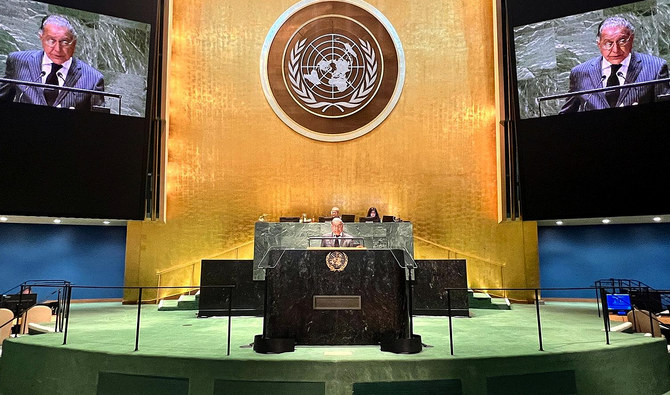
- The US blocked a strongly supported Algerian resolution calling for Palestine’s full UN membership on April 18
- Ambassador Munir Akram says Palestine’s membership will rectify ‘historic injustice,’ benefit the two-state solution
ISLAMABAD: Pakistan’s Permanent Representative to the United Nations Ambassador Munir Akram said on Wednesday the Security Council should reconsider Palestine’s application for full membership to the world body after it was rejected last month following the American decision to cast a veto.
Palestine holds the status of a Permanent Observer State at the United Nations since November 29, 2012, allowing it to participate in General Assembly debates and co-sponsor resolutions, though it lacks voting rights.
Prior to that, it was considered merely an “entity” by the UN, which limited its ability to engage formally in proceedings and symbolized a lesser recognition of its sovereignty claims.
The Algerian resolution calling for Palestine’s full UN membership was blocked by the United States on April 18 despite being strongly supported by other countries.
“Pakistan has urged the UN Security Council to reconsider & recommend Palestine’s application for a full membership of the UN in line with the overwhelming global opinion,” the country’s mission at the UN announced in a social media post after a General Assembly meeting was held to review the development. “It said that such a step would rectify the historic injustice & be pivotal toward the Two-State solution.”
It informed Ambassador Akram told the meeting “diplomatic efforts being made for peace would get considerable momentum if the veto was lifted & Palestine’s admission to the UN was approved by the Security Council.”
The Pakistani diplomat reiterated his country’s stance over the ongoing war in Gaza, calling for an immediate ceasefire and demanding unrestricted access to humanitarian aid.
He also emphasized that any further escalation in the war must be prevented while seeking a revival of the peace process and asking the world community to hold Israel responsible for its “war crimes.”
“The veto cast against Palestine’s admission erodes the credibility of the assurances that have been held out to support the two-state solution,” Akram was quoted as saying by the state-owned Associated Press of Pakistan news agency in its report.
Pakistan to announce T20 squad for England, Ireland series today as World Cup looms

- Pakistan will face Ireland in three T20Is from May 10-14, England in four T20Is from May 22-30
- Pakistan will use both series to prepare for ICC Men’s T20 World Cup 2024 slated for June 2024
ISLAMABAD: The Pakistan Cricket Board (PCB) said it would announce the national T20 squad for Pakistan’s upcoming away series against Ireland and England today, Thursday, with exactly a month to go before the T20 World Cup kicks off in June.
Pakistan will play three T20Is against Ireland in Dublin from May 12-14 before they take on 2022 World Champions England from May 22-30 in a four-match series.
The series will be an important one for Pakistan and England as both prepare for the T20 World Cup scheduled to kick off from June 2 in the US and West Indies. Pakistan’s matches against England will be played at Leeds, Birmingham, Cardiff and The Oval.
“The Pakistan Cricket Board will hold a media conference at the Qaddafi Stadium in Lahore on Thursday to announce Pakistan men’s cricket team for the tours of Ireland and England,” the PCB said in a press release.
The announcement will be made by the Men’s National Selection Committee at 11:15 a.m., the board said.
Skipper Babar Azam’s side last week won their fifth T20 match against New Zealand in Lahore by nine runs to draw the series 2-2.
Pakistan will begin their campaign for the T20 World Cup against the United States on June 6 before facing India in New York for a high-voltage clash.
Schedule for Ireland, England series:
10 May – v Ireland, 1st T20I, Dublin
12 May – v Ireland, 2nd T20, Dublin
14 May – v Ireland, 3rd T20I, Dublin
22 May – v England, 1st T20I, Leeds
25 May – v England, 2nd T20I, Birmingham
28 May – v England 3rd T20I, Cardiff
30 May – v England, 4th T20I, The Oval
Saudi crown prince sincerely wants Pakistan to progress— PM Sharif
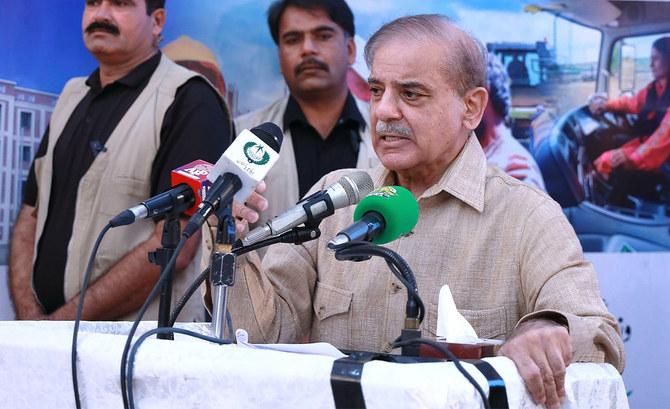
- PM Sharif says Saudi business delegation’s upcoming visit to Pakistan will enhance its economic ties with Kingdom
- Sharif returned from Riyadh this week after holding extensive discussions on trade, investment with Saudi officials
ISLAMABAD: Saudi Crown Prince Mohammed bin Salman sincerely wants Pakistan to progress and prosper, Prime Minister Shehbaz Shari said on Wednesday after returning from a trip to the Kingdom earlier this week.
Sharif was in Riyadh from Apr. 27-30 to attend a special two-day meeting of the World Economic Forum on global collaboration, growth and energy. The Pakistani prime minister met the Saudi crown prince and the Kingdom’s various ministers to discuss bilateral investment and economic partnership during his stay.
Sharif spoke about his recent visit to the Kingdom during a luncheon he hosted at his Lahore residence for laborers and their families on the occasion of Labor Day.
“I have just returned from Saudi Arabia and believe me, my honorable brother there, Crown Prince Mohammed bin Salman, with all his heart, wants Pakistan to progress and wants to see prosperity in Pakistan,” Sharif said to loud applause.
The Pakistani prime minister said he held extensive meetings with Saudi ministers and their teams in Riyadh on the sidelines of the WEF meeting, describing them as “extremely satisfactory.”
“In a few days, [a delegation of] Saudi businesspersons will come to Pakistan and that will enhance our trade relations,” he said.
In February 2019, Pakistan and Saudi Arabia inked investment deals totaling $21 billion during the visit of the Saudi crown prince to Islamabad. The agreements included about $10 billion for an Aramco oil refinery and $1 billion for a petrochemical complex at the strategic Gwadar Port in Balochistan.
Saudi Foreign Minister Prince Faisal bin Farhan visited Pakistan last month with a high-level delegation to strengthen bilateral economic cooperation and push forward previously agreed investment deals with the South Asian country.
Pakistan has said it pitched investment projects worth $30 billion to Riyadh during Prince Faisal’s visit.
Pakistan and Saudi Arabia enjoy strong trade, defense and cultural ties. The Kingdom is home to over 2.7 million Pakistani expatriates and serves as the top source of remittances to the cash-strapped South Asian country.
Both Pakistan and Saudi Arabia have been closely working to increase bilateral trade and investment deals, and the Kingdom recently reaffirmed its commitment to expedite an investment package worth $5 billion.
Cash-strapped Pakistan desperately needs to shore up its foreign reserves and signal to the International Monetary Fund (IMF) that it can continue to meet requirements for foreign financing which has been a key demand in previous bailout packages.
Saudi Arabia has often come to Pakistan’s aid in the past, regularly providing it oil on deferred payments and offering direct financial support to help stabilize its economy and shore up its forex reserves.










